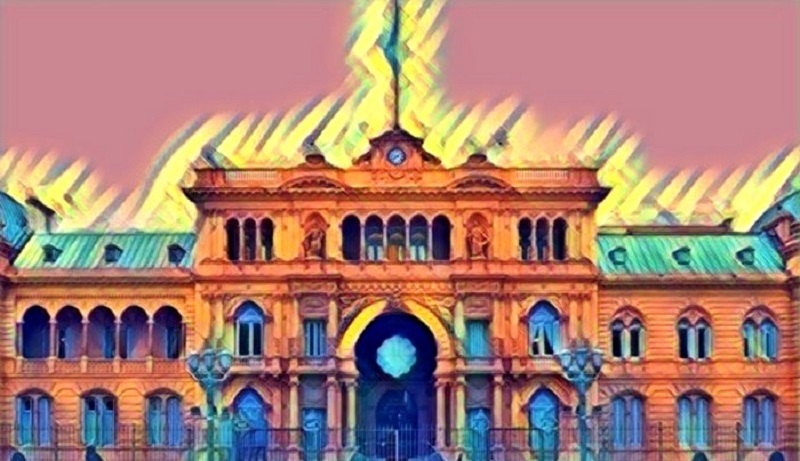
By the time he finished giving his speech, he was exhausted. For 40 minutes, he had given it his all. He had worked like never before, in a fiery way, to defeat his adversaries and give the final touch to the triumph for which he had been fighting for months. He ran on March 14, 2015 and the eyes of the country, as it had not happened in a long time, were perched on the radicalism, which was meeting in Gualeguaychú. That day, Ernesto Sanz did it. By 186 votes to 130, the Radical Civic Union voted by majority to form an alliance with the PRO and the Civic Coalitionruling out Sergio Massa and other options. would be born let’s change. And, almost 14 years after the 2001 catastrophe, Leandro Alem’s old party would rise from its ashes and return to power. Or, at least, that’s what they thought.
The euphoria, however, was short-lived. Not even 48 hours had passed after the Convention when Mauricio Macri declared in the media -in a stabbed in the back- that “he who wins the STEP governs and the one who loses accompanies”. In other words: there would be no coalition management like the one that had been sold in Gualeguaychúbut the radicals -when their foreseeable internal defeat was consummated- would be back in government, but far from power. Sanz, alleging personal problems, decided not to be part of that story that he had helped create, and returned to his native Mendoza as soon as the campaign ended, even before the inauguration on December 10. From then on, the story of the UCR in Cambiemos would be that of an actor who would accompany the macrista adjustment, but in a supporting role. In any case, for a party that is over a hundred years old, a broader look, far from the short term, reveals that the balance is not bad: the party that had left the Casa Rosada by helicopter was regaining some weight on the national scene. For national politics, however, it would leave the balance of the difficulty of forming government coalitions.
Eight years later, those stories are updated. The -again- right-wing opposition discusses new experiments and electoral combinations to return to power. However, the crises, this time, take place in advance. If years ago everything were hopeful promises and yellow balloons portending a change for the better, now the promises naive they became obsolete. Nobody wants to hear them, nobody can say them. The crisis is too great to sweeten it with a magical pass from duran barbism. Unlike that time, when the project was mounted on the basis of the wear and tear of the Kirchner government, now the possible return loads on their backs also with his own failure. The social mood is different, political confidence is less and the economic crisis drags on in time in what seems like an eternal present of decadence.
Paradoxically, if radicalism, relegated to the background in the first allianceDespite everything, he came out revitalized. The person who came out hardest hit by that cambiemite experience in power was the PRO, who dominated the management from beginning to end. Today the eyes of the internal fire are not concentrated on Gualeguaychú, but on Uspallata street, the bunker from where Horacio Rodríguez Larreta set the yellow internal fire on fire in recent days.
Unlike the years of unquestioned leadership of Mauricio Macri, the failure of the first time cambiemita opened the game like never before in the PRO for the emergence of leaders who dispute the head of the founding leader of the space. In the field of personal projects, the aspirations of politicians who prepared their entire lives to reach the top of power and see that their opportunity is here and now in the face of the great crisis that Peronism is experiencing, intersect. But in the strict field of political projects, the differences in balances and perspectives gave rise to divisions between hawks y pigeonswho programmatically and in the future debate the necessary degrees of consensus or shock that will be needed to apply the adjustment plans and structural reforms with which everyone agrees.
If Macri’s resignation to be a candidate makes just two and a half weeks (motivated by its low electoral ceiling and perhaps also by the difficulties it would have to govern) could be interpreted as a possible order towards a more appeased internal, the last hours seem to suggest, rather, the opposite.
The decision of Horacio Rodriguez Larreta to call concurrent elections in the City of Buenos Aires, against the opinions and interests of Macri himself, Patricia Bullrich and María Eugenia Vidal, has led to a leap in quality in the public confrontation of the PRO. In reading the hawksthat decision weakens the drag that the presidential candidacies of the PRO -stronger than the radical ones- could have in favor of a yellow candidate for the head of Government of the CABA -in his wishes, cousin Jorge- and instead benefit Martín Lousteau, one of the referents of the radical leg with which Larreta negotiates a structure and a support base for his presidential project, in counterweight to the armed macrista that from Uspallata they see inclined towards Bullrich.
Among the readings that see the space crisis as more advanced, there are those who go so far as to consider that we are still on time, before June 14, for a rupture of the Together for Change alliance that constitutes a new and profound shock on the political chessboard. . Those who do not go as far see a political coalition becoming tense, with costs that are still difficult to measure: in the event that it is finally resolved in an internal one, will the winner of the same retain most of the votes of his opponent in October? In other words: if Larreta wins, will Bullrich’s voters follow him in the general elections or could they lean towards Javier Milei or towards abstention? And in the reverse case? In the deep concern to guarantee governancesome may be seriously compromising their chances of victory in the PASO, while in the deep concern to win the primaries, others may be raffling off a good part of the already difficult possibilities of successfully managing the country’s destinies after 10 from December.
Those divisions, which occur above, also have their correlate below, in a space that has, we could say, two souls. In a book published in 2021, coin in the air, Pablo Gerchunoff, in a reading in which other analysts also agree, pointed out that with the turn of 2015 towards macrismo, voted in Gualeguaychú, would “put an end to the divorce between the sociology of the radical vote and the political discourse of its leaders. Today there are middle sectors that feel much more comfortable because they do not have to turn a deaf ear to what the progressive radical leaders say. There are many people who listen to the PRO and say: finally someone speaks to us in the language we always wanted to hear”. That public, and that electorate, is in dispute in the PRO and it is also the one that Larreta will have to show that he cannot lose by facing Macri and at the same time addressing a radical voter more from the center or progressive. It remains to be seen if it is an impossible mission. The “milei factor” does not make this task easy, far from it.
This new escalation in Together for Change, needless to say, adds to the deep crisis of Peronism on the political scene that he comes from disappointing his social base by having defrauded all his campaign promises and generates a fight that can even take him to the punches, while Javier Milei demagogicly exploits the eternal crisis of the bicoalitionist regime in Argentina. Each new episode, each new inmate, adds more foundations to a phrase that is beginning to spread: politics is, more and more, a circus without an audience.increasingly divorced from broad swaths of a society that, to a large extent, is much more driven by day-to-day survival and watches the show with disinterest.
In these dilemmas, what is the most uncertain presidential election of the last 20 years in Argentina is being prepared at this time. The data is not minor: the weakness of the political regime is fed back with a long and deep economic and social crisis. While the weakness of the two main coalitions of the regime is largely explained by the economic failures of the last two governments, at the same time that same political weakness is transformed into the first crisis of the next term, which will have great difficulties to be a pilot storm of the next stage of the IMF viceroyalty, marked by new mandates that will come from Washington and the beginning of strong debt maturities that were kicked forward. Whether Peronism wins (which is submerged in a very deep crisis that means that it does not have clear candidates with so little time remaining), or whether Together for Change triumphs, dragging not only the burden of its previous failure but also its internal and deep wounds that they probably leave, what is envisioned is a next government with little political volume to apply -with more shock or more consensus- the new adjustment plans that everyone announces with more or less concealment and that includes, as a move, a devaluation coup (if it does not occur before December 10). In the scenario of a more resounding turn in the situation that would lead Javier Milei to the presidency, reality would only make the television demagogy of his plans fall like a house of cards, devoid of any serious political and social support for be carried forward.
In any case, what it is about is facing today and what is to come, with another perspective. The strong divisions and gaps between those at the top are an expression of the crisis, but at the same time they are the possibilities that those at the bottom have to slip into history and start writing it with their own name. For that today, now, it is necessary, with everything, to give volume to another project. Give strength to the left, because Given the decadence of the political regime, it never hurts to remember that there is a policy of another class.
Source: www.laizquierdadiario.com

